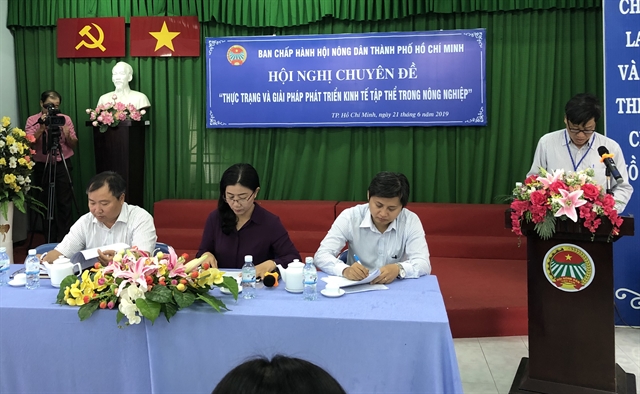Local co-operatives need to mobilise capital from their members or co-operate with enterprise members to improve their production and trading, the HCM City Cooperative Alliance has said.

Local co-operatives need to mobilise capital from their members or co-operate with enterprise members to improve their production and trading, the HCM City Cooperative Alliance has said.
Speaking at a seminar on developing the collective economic model in agricultural in HCM City yesterday, Bui Tran Huy Vinh of the HCM City Cooperative Alliance, said: “The Capital Aid Fund for Cooperative Members of HCM City (CCM Fund) provided loans worth VND1.52 trillion (US$65.4 million) to 60,849 applicants last year and VND332.3 billion ($14.2 million) to 11,510 applicants in the first half of this year.
“The money has helped co-operatives and their members, thereby contributing to economic development and building rural areas and reducing usury.”
"But many co-operatives are unable to borrow from banks or the CCM Fund since they lack assets to mortgage or feasible business plans," he said.
Nguyen Van Luong of the HCM City Farmers Association said in addition to the difficulty in getting loans on easy terms, co-operatives and co-operative groups also faced other difficulties such as low productivity, lack of steady outlets for their products and lack of qualified human resources.
Vinh said co-operatives needed to be more active in raising capital from members.
“Co-operatives themselves need to make the effort and should not depend on the Government‘s support.”
A representative of the city Department of Agriculture and Rural Development said agro-forestry and fisheries production was worth VND21.4 trillion last year, a year-on-year increase of 6.2 per cent.
To enable the collective agricultural sector to develop more efficiently, the department had proposed many measures, including providing loans for hi-tech agriculture, organising trade promotion activities to boost consumption of co-operatives’ products and organising programmes to enhance transfer of farming and animal breeding technologies and models that can adapt to climate change and saltwater intrusion, he said.
The city sought to achieve rural per capita income of VND100 million by 2025 and ensure 20 per cent of the population joins co-operatives compared to 11.9 per cent now, he said.
"The collective economic sector, especially co-operatives, plays an important role in achieving the targets," he said.
Nguyen Thi Bach Mai, chairwoman of the HCM City Farmers Association, said the association had drafted a plan on “One District, One Cooperative model on hi-tech agricultural material supply, and hi-tech agricultural production and consumption in 2019-23” to enable restructure of the agricultural sector.
The city has 85 co-operatives and one union of co-operative in the agricultural sector, with most of them growing vegetables, orchids or mushroom or raising dairy cattle, pigs, crocodiles, shrimp, or fish.
Co-operatives have gradually established their brands and their product quality has steadily improved, enough to be sold by large supermarket chains such as Co.opmart, Big C, Aeon, and VinMart.
At the seminar, the association signed agreements with retailers, including Saigon Co.op and VinMart, to sell products. — VNS





